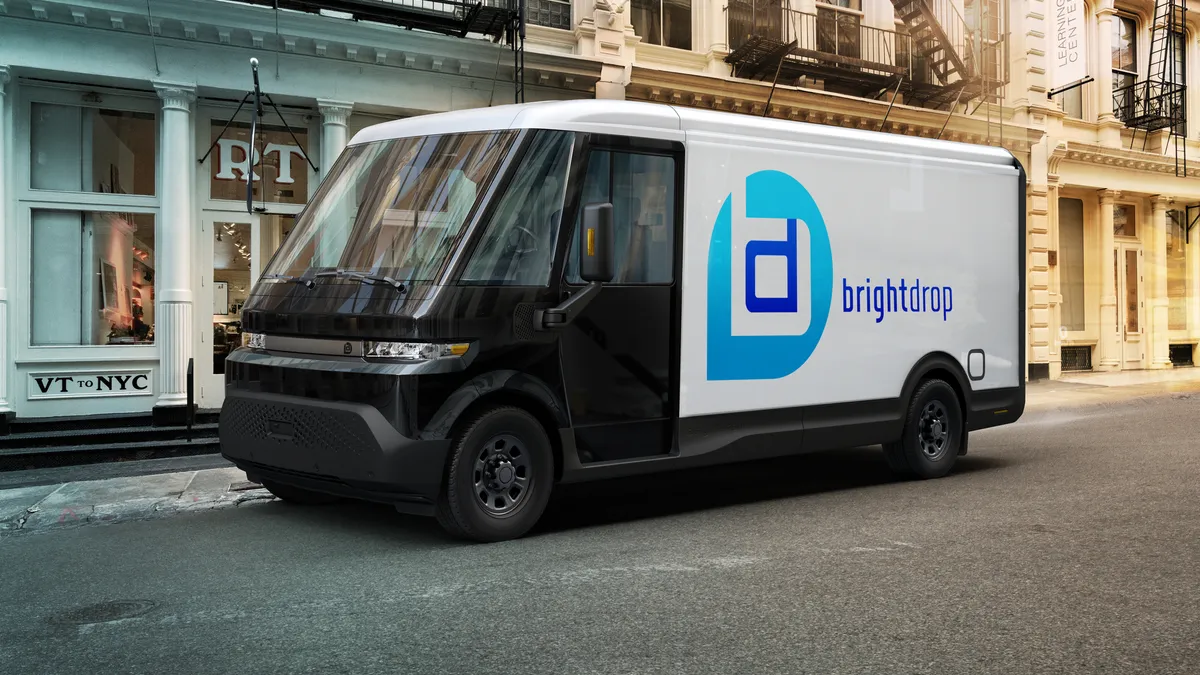Thousands of new electric delivery vehicles will be humming through city and suburban streets, according to announcements made at the Consumer Electronics Show (CES) in Las Vegas this week. FedEx said it reserved priority production for 2,000 BrightDrop vans, adding to the 500 the company ordered from the General Motors subsidiary last year. Walmart wants 5,000.
GM launched BrightDrop one year ago to provide zero-emission commercial vehicles, smart containers and software for fleet and mobile asset management.
FedEx took delivery of its first five BrightDrop EV600 vans last month at its facility in Inglewood, California. To keep them running, FedEx installed 500 charging stations across the state. During a press conference at CES, FedEx Express Regional President of the Americas and Executive Vice President Richard Smith said the company is looking to add 20,000 more BrightDrop vehicles, subject to negotiations. FedEx will ultimately need 200,000 electric delivery vehicles, Smith added.
The shipping giant is also testing the BrightDrop EP1, a motorized rolling cart that drivers can use to make multiple deliveries from one vehicle stop, such as at an office building or apartment house. Following pilot programs in Toronto and New York City, FedEx will expand EP1 testing to 10 markets this year.
Walmart plans to use BrightDrop electric vans for its InHome delivery service, which allows customers to have their goods, including food orders, delivered inside their house and put away or put in the refrigerator by the Walmart delivery person. Walmart CEO Doug McMillon said the retailer is expanding the service to reach 30 million U.S. households by the end of 2022.
In additional EV fleet-related news from CES, General Motors CEO Mary Barra debuted the battery-electric Chevrolet Silverado pickup truck, which will be available as both a consumer and work vehicle. Available to fleet operators in 2023, it will have a 400-mile range.
Barra also announced that all GM heavy-duty trucks will be available as zero-emission vehicles by 2035. She added that the company is investing $35 billion in electric and autonomous vehicles.
Indigo Technologies, also exhibiting at CES, showed designs for two urban electric vehicles for the rideshare and delivery markets, one that's similar to a minivan and the other like a small SUV. The vehicles feature robotic wheels, active suspension and a low, flat floor. The company is marketing them to fleet operators and gig drivers.
Silicon Valley startup Udelv released a video debuting its autonomous delivery vehicle, which it said can carry up to 2,000 pounds and make 80 stops per delivery cycle. Intel subsidiary Mobileye provides self-driving technology to the vehicle. Udelv said it has amassed more than 1,000 reservations, including a contract with the U.S. Air Force for a pilot program at Edwards Air Force Base in California.
Swedish electric truck manufacturer Volta Trucks is taking pre-orders for its electric 16-ton Volta Zero, which it markets for city-center freight delivery. The company announced that its vehicles will integrate HERE Technologies' navigation services, which include route planning, precise geolocation and battery range prediction.
Stellantis, the company formed by the merger of Fiat Chrysler Automobiles and the PSA Groupe (Peugeot), announced Amazon as its first commercial customer for the battery-electric Ram ProMaster van, with deliveries beginning in 2023. Stellantis said the vehicle was designed with input from Amazon to include "unique last-mile delivery features." Amazon said it will put thousands of the zero-emission vehicles on the road in the U.S. every year.












